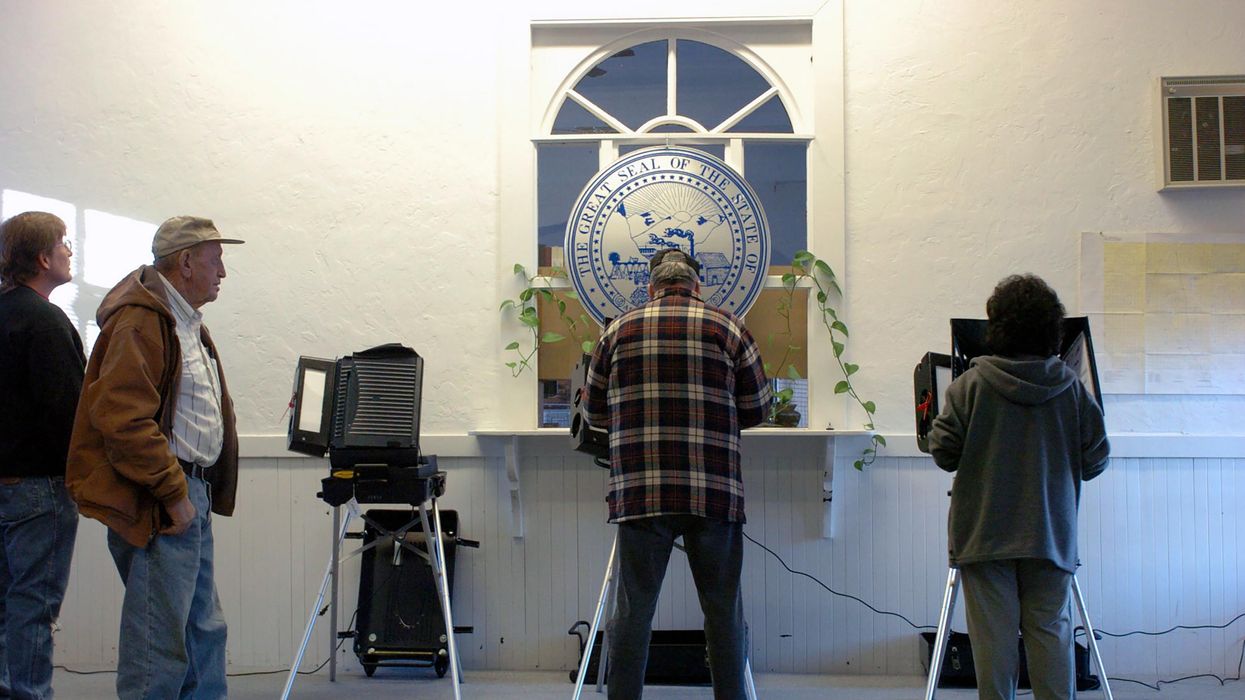Maxmin's campaign was focused on providing help to people in a part of Maine where many feel disillusioned by politics and neglected by leaders in the state legislature and Washington, D.C.--but her energy was spent less on convincing voters to back a progressive agenda and more on giving them a platform to talk about their own experiences.
"Too often we talk about these things in a partisan lens, but overwhelmingly people believe we need to tax the wealthy, that we need to raise the minimum wage, that we need sick days, paid family leave, healthcare access that's real, that everyone can see a doctor when they need to. Those are not limited to a party. And when you build a multi-race, multi-class coalition like Chloe did... That's how you win in those places."
--Mike Tipping, Maine People's Alliance
"When I talk to folks, I mostly listen, I don't show up and talk about myself," Maxmin told Common Dreams on Thursday. "I really try and listen and make sure that the voices that I hear are reflected in our campaign... The work that we do on our side is to really think about campaigns differently, because we see them as one of the primary ways that we can start building a new type of politics. So we didn't use any party consultants. We designed all of our mailers, palm cards, postcards ourselves. We're all about authentic conversation and just had dozens and dozens of volunteers writing postcards or having conversations with voters and using the same style of just listening, and not going around saying, 'You should vote for Chloe because of this,' but trying to understand where people are at."
"My sense is that people really saw that we were doing it differently and that I could be in office differently, too," she added.
When the Covid-19 pandemic hit earlier this year, the Maxmin campaign further stepped up its commitment to engaging directly with voters, enlisting 200 volunteers to check on voters' well-being.
"Maxmin called upon her volunteers to reach out to every senior in her district and her network of campaign volunteers provided food, assistance with prescription drugs and identified transpiration needs," Marie Follayttar, director of the progressive grassroots group Mainers for Accountable Leadership, told Common Dreams. "Chloe is both a community organizer and an elected official. Not only is Chloe willing to listen to the people where they are--at their dinner table or at their door--she is demonstrably responsive to their needs and leverages the organizing structure of her campaign to assist her in accomplishing mutual aid work."
Other Democratic campaigns in the state, Follayttar noted, "could have done this as well. We transform lives by being present in them and building community to support one another. We move into legislative action by turning the concerns heard at the door into legislation."
Maxmin, who introduced the state's Green New Deal in 2019, with the notable backing of the state AFL-CIO, and co-founded the fossil fuel divestment campaign Divest Harvard while in college, won applause from national climate action campaigners at 350.org and Friends of the Earth.
"Just seeing the amazing news that Chloe Maxmin--who was a young leader of Divest Harvard--has won a seat in the Maine State Senate!" exclaimed Thelma Young-Lutunatabua, an organizer with 350.org, on Wednesday. "Youth of the climate movement gaining political office!"
Maxmin's tactic of engaging authentically with voters is reminiscent of "deep canvassing,"a method of campaigning used by the national grassroots network People's Action and found to be 102 times more effective at winning over undecided voters than a typical brief interaction during a door-knocking or phone-banking campaign.
"Deep canvassing differs from traditional campaign tactics because it relies on soul," People's Action director George Goehl told Common Dreams. "In a deep canvass conversation, you break down your walls and the canvasser and voter really connect with one another. This is the kind of organizing that changes hearts and minds."
Maxmin told Common Dreams that her campaign led her to "thousands" of similar interactions.
"I had thousands of conversations with people," she said. "And it's so interesting when you have that kind of breadth to your exposure of humanity, just the themes that you hear. And it was really, really consistent--rarely hearing direct issues, mostly hearing about how people are so frustrated with everyone and everything on both sides and just hating the negative campaigning."
Mike Tipping of Maine People's Alliance, an affiliate of People's Action, credited Maxmin's ability to connect with voters across party lines, stressing that Maxmin ran a campaign she defined as "bipartisan" rather than "progressive" because issues that matter to voters in her rural district are important to people of all political beliefs.
"These are universal progressive values," Tipping told Common Dreams. "Too often we talk about these things in a partisan lens, but overwhelmingly people believe we need to tax the wealthy, that we need to raise the minimum wage, that we need sick days, paid family leave, healthcare access that's real, that everyone can see a doctor when they need to. Those are not limited to a party. And when you build a multi-race, multi-class coalition like Chloe did... That's how you win in those places."
In "Rural Runner," a short film by Forest Woodward about Maxmin and her campaign manager, Canyon Woodward, Maxmin is seen knocking on doors in rural Maine, talking to voters about how their lives could be impacted by a Green New Deal for the state and other progressive legislation.
"Every year we keep electing the same kind of folks," she says in the film. "They tell us the same things, they act the same way, we elect them, they get into the state House, and they break the same promises and we're left with the same disillusionment that we had before."
In 2018, Maxmin began her campaign in House District 88 as an underdog, 16 points behind her opponent, but credited her tireless face-to-face campaigning with securing victory.
"What Chloe and I have done is pretty simple," said Woodward in "Rural Runner," which was filmed as the team was beginning Maxmin's campaign for the state Senate race. "We put one foot in front of the other, we listen, we show up every day rain or shine, we do our best. We never really know what we're capable of unless we try."
After becoming the first Democrat ever to win House District 88 at the age of 26, Maxmin introduced her state's own Green New Deal, centering the legislation on a just transition for workers in the fossil fuel sector and investing in solar installations for newly-built schools.
In the State House, she has also sponsored legislation to provide access to rural public transportation, an issue she campaigned on this year and called "the great equalizer in rural communities." Maine Senate District 13 has been represented by Republicans for most of the last decade.
While the national Democratic Party often express wariness about engaging with voters in traditionally conservative areas about issues erroneously deemed "left wing," such as far-reaching action to solve the climate emergency, Maxmin's winning campaigns suggest Democrats can find more success with rural voters by being unapologetic proponents of policies aimed at helping working people.
"She is no shrinking violet and didn't try and moderate herself or be anyone other than who she is, and I think voters responded to that," Tipping said.
During the campaigns Maxmin and Woodward have run together, they wrote in an article for The Nation in 2018, "We dig into the local, cultivating relationships and utilizing the resourcefulness of our rural communities to build a rooted movement... We see that rural America is alive and beautiful, eager to be heard and remembered."
"Many have welcomed us into their homes and honored us with stories of family members who are registering to vote just for our campaign, who are voting Democrat for the first time, who have never voted in a midterm but now are because our movement gives them hope," they continued.
"We view our campaign as a movement, built on shared values and authentic conversations," Maxmin and Woodward wrote. "We build real political power, with lasting muscle for the long fight, with an inside-outside movement that elects authentic representatives to fight for everyone and continues to organize beyond the election to maintain pressure on our politicians."




